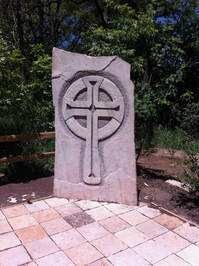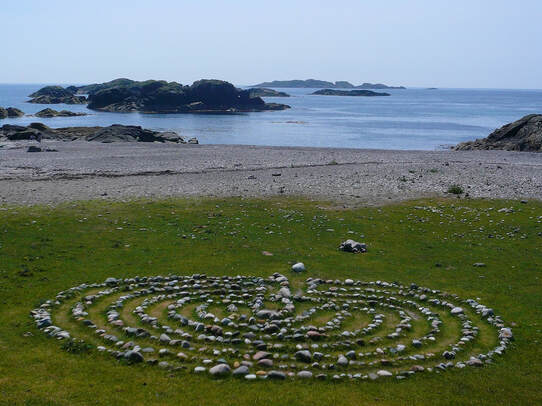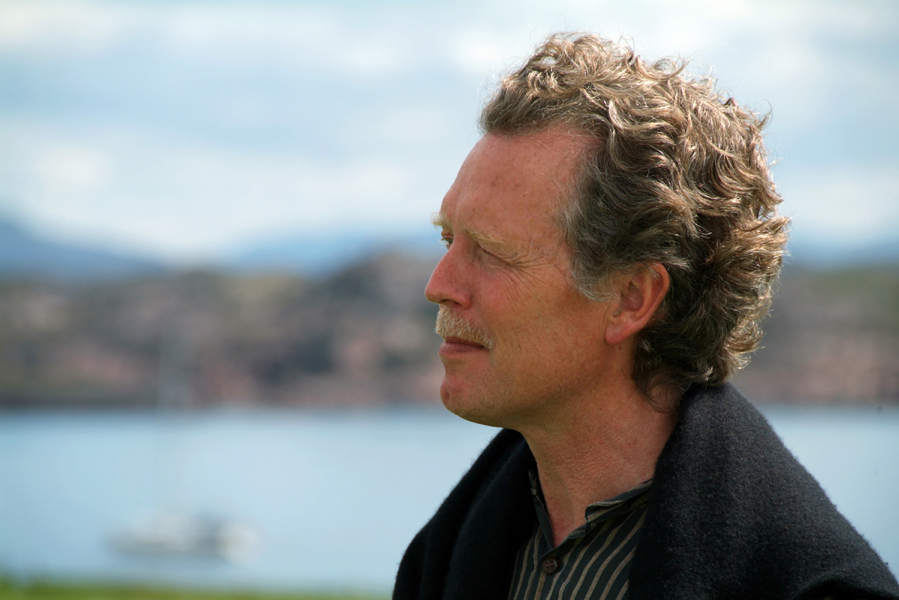 Different things have shaped and informed our spiritual journeys as we walk through life. It’s unlikely that you are in exactly the same spiritual place that you were ten or twenty (or sixty…) years ago. Are there things that have brought freshness into your spiritual life along the way? A deep influence on my journey has been Celtic Christian spirituality. Back in 2007, I was given a Lilly Clergy Renewal grant that helped Plymouth support my sabbatical and also helped bring parts of my experience back to Plymouth. The Lilly grant helped fund the first visits of John Philip Newell and John Bell, Scottish ministers involved with the Iona Community, which provided the initial impetus for the Visiting Scholar program. There are other enduring reminders of Celtic spirituality at Plymouth that include our Living Celtic Christianity group that has been meeting for 16 years, the lovely Celtic cross in our memorial garden that mirrors a slab cross in Glendalough, Ireland. And I know that the influence of Celtic spirituality stays with those who traveled on pilgrimages with Jane Anne and me to Ireland and Scotland and with others as well. What drew me to Celtic spirituality was its authenticity and breadth. Concern for the created world and for humanity is an essential element of the tradition that carries over from the indigenous traditions of the early Celtic world. The inherent goodness of creation is seen through prayers that reflect everyday experience. You may hear that in the benediction I often use: “Deep peace of the running wave to you…” Here is a prayer I use each morning: Christ as a light, illumine and guide me. Christ as a shield overshadow me. Christ over me, Christ under me, Christ beside me on my left and on my right. This day, be within and without me. Be in the heart of each to whom I speak And in the heart of each who speaks unto me Christ as a light, Christ as a shield, Christ beside me on my left and on my right. The inclusion of women in leadership, while not universal, is solidly within the tradition. St. Brigid of Kildare led a monastery that included both women and men. And her legacy continues in Kildare at Solas Bhride, a community of eco-feminist nuns we visited on our pilgrimage. There is obviously a lot more of the tradition to explore! Happily, St. Patrick’s Day falls on a Sunday this year, and we will be celebrating on March 17 with worship in the Celtic style. I hope you’ll join us at Plymouth for worship. Blessings to you! P.S. Don’t forget that Daylight Savings Time begins Saturday night: Spring Forward!
On Friday evening and Saturday, a half-dozen members of Plymouth trekked down to St. John’s Episcopal Church in Boulder for a workshop with the renowned Canadian-Scots cleric and scholar, John Philip Newell. And I am thrilled to let you know that he will be with us at Plymouth this time next year! (Hold the evenings of May 12 and 13, 2020.) I am really glad to bring a taste of our 2016 Scotland Pilgrimage to Plymouth! Our Celtic Christianity groups certainly know John Philip’s work, like Listening for the Heartbeat of God and Celtic Prayers from Iona, and if you’ve worshipped with us at 6:00, you’ve sung his version of the Lord’s Prayer, which begins, “Ground of all being, Mother of life, Father of the universe, your name is sacred.” His is one of the principal voices of the resurgent movement that explores Celtic Christianity. I was curious about what “Celtic Consciousness” means…because the ancient Celts were, in fact, unaware of their Celticity in the same way that Bach was unaware of his Baroqueness! For John Philip, there are two strands of late classical/early medieval Christianity in the west: Celtic Christianity and Imperial Christianity. “Celtic Consciousness” is what survives in the former. Celtic Christianity developed on the western fringe of Europe from Galicia to Brittany to Wales to Ireland to the Isle of Man to Scotland. It interpreted Christianity in continuity with the earth-based indigenous religions encountered by the Christian mission. (St. Columba of Iona even said, “Christ is my druid.”) It recognized the inherent goodness of life, including human life, as created in the image and likeness of God. Imperial Christianity, made the official religion of the Roman Empire in 380 AD, created and enforced doctrine that perhaps had as much to do with control as with anything having to do with the teachings of Jesus, including the doctrine of original sin…the idea that humanity is, at its core, sinful, and that it can only find redemption through Christian adherence. I don’t want to spoil any secrets, but there are a few choice things John Philip said: “‘Born again’ has been hijacked, and we need to reclaim that phrase.” “Original sin is a Christian problem, not a Jewish problem. And Jesus was a Jewish rabbi.” “Our work is to speak from a place of humility and from our own deep knowing and to listen to others’ deep knowing.” “Empire does not want humans to be reminded that God is at the heart of every human being, otherwise it would be difficult to oppress them.” “God’s grace is not to free us from our deepest nature, but to help us embrace our deepest nature.” “We are birthing a new Christianity… are we willing to endure the birth pangs?" If you’d like to learn more about John Philip or Celtic Christianity, try one of our two Celtic Christian Spirituality Groups when they reconvene in the fall, at 8:00 a.m. on Wednesdays or 9:00 a.m. on Tuesdays. And you can find his books here on Amazon. Springtime Blessings! AuthorThe Rev. Hal Chorpenning has been Plymouth's senior minister since 2002. Before that, he was associate conference minister with the Connecticut Conference of the UCC. A grant from the Lilly Endowment enabled him to study Celtic Christianity in the UK and Ireland. Prior to ordained ministry, Hal had a business in corporate communications. Read more about Hal. |
Details
|




 RSS Feed
RSS Feed